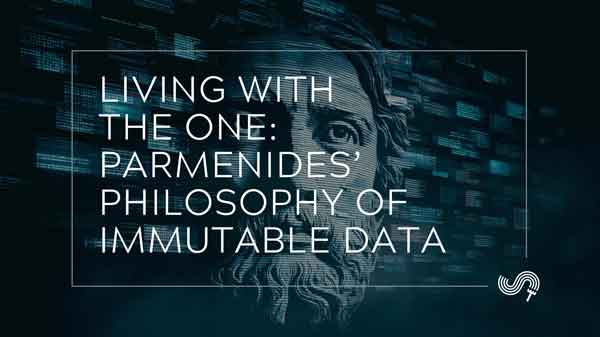



Parmenides begins from the stark first principle that "what is, is" and therefore cannot slip into "what is not." In modern words, existence is indivisible and motionless. When we look at a database from the same angle, we see that every row we insert is a claim about reality. Either the claim exists or it doesn't; partial existence makes no logical sense. Designers often behave as though a row could be half‑alive while a transaction is in flight, but Parmenides reminds us that an intermediate state is a convenient illusion. The rock‑bottom fact is binary: the fact is stored or it is not.
If reality is One and unmoving, then updates feel suspect. Why overwrite yesterday's balance with today's? At first principles, the only safe operation is to widen the set of things that exist. This leads straight to an append‑only log, where each write simply states another truth without erasing earlier truths. Event sourcing and immutable column stores follow from this principle the way night follows day: they let the database grow the world's description while respecting the axiom that something once existent cannot slip into non‑existence.
Time appears to threaten the frozen universe, yet it can be handled without violating immutability. Treat each fact as paired with a validity interval: a "from" and a "to." The moment‑to‑moment flow we perceive is not a mutation of being but a change in which intervals a query decides to read. Seen this way, "update" is just shorthand for "insert a successor fact whose interval starts where the previous one ends." The underlying substrate remains perfectly still; only the observer's choice of slice creates the sense of motion.
Zeno's paradox of Achilles and the tortoise captures a worry every streaming system faces: if new events keep arriving, can a consumer ever finish its catch‑up? First principles say yes, because the chase is measured not in absolute distance but in converging series. Checkpointing, snapshot isolation, and materialized views turn the infinite race into a finite one by letting the reader declare a horizon. The reader does not need to outrun the writer; it only needs a stable cut of the log in which each prefix is complete.
Consistency, for Parmenides, is unavoidable: the One cannot contain contradictions because contradictions would imply non‑being. In distributed storage the analog is monotonicity. Operations must either commute or be totally ordered so that replicas cannot diverge into mutually impossible worlds. CRDTs and sequential commit logs are practical embodiments of this axiom. They do not rely on good luck; they rely on algebraic properties—idempotence, associativity—that make contradictions impossible by construction.
Parmenides distrusts the senses, claiming that reason alone reaches truth. In a database, raw storage blocks and page caches correspond to the senses: noisy, partial, and easily tricked. The query planner, armed with relational algebra or Datalog rules, plays the role of pure reason. It derives results from immutable premises without being swayed by where bytes physically live. When we normalize schemas or project columns, we are not decorating facts; we are exposing their logical form so that reason can speak without the interference of storage artifacts.
A common fear is that an indivisible store cannot scale. First‑principle thinking flips the question: what actually needs indivisibility? Not hardware, but the ordering of facts. If rows never change once written, shards can be assigned by key range or hash without cross‑node locks, because no shard ever needs to revoke a claim it has already made. Replication pipelines can stream facts downstream exactly once, confident that replay cannot produce a different truth value. Google's Spanner, CockroachDB, and similar systems marry this immutable order with physical clocks to give the impression of a placid whole even as servers churn.
The Eleatic lesson is not that we must freeze every table forever, but that we should design as if every piece of data deserves to persist unless the laws of logic demand otherwise. Appending instead of mutating, representing time as data rather than code, and enforcing convergence algebraically strip away incidental complexity. By grounding our architecture on the same minimal axioms that guided Parmenides—existence, non‑contradiction, and the sufficiency of reason—we build systems that are easier to reason about, safer to operate, and surprisingly agile precisely because, at their core, they do not move.